- Home
- Lisa Wingate
Dandelion Summer Page 35
Dandelion Summer Read online
Page 35
Some days, I just wanted to walk out of this whole, stupid life—skip writing about To Kill a Mockingbird and get a job and my own place. J. Norm would be all over me for even thinking about it if he found out, though. He’d probably get right up out of that hospital bed, and . . .
“Russ, there’s a car coming,” I hollered over my shoulder. A high-dollar ride was melting out of the heat waves a couple blocks down. It was silver, something expensive, like a Beamer or an Acura. A new one. Nothing like people from our neighborhood would drive. “Russ, there’s a car!” But Russ couldn’t hear me. He’d started the grinder, and he was busy running the wire brush on a rusty gun barrel. I set my notebook down and started toward the carport. If Russ didn’t get the big insurance settlement he was counting on, it would be my fault, since I was the lookout. Russ and Mama had plans for that money. Russ wanted to find a bigger, better trailer for his business, and they were gonna buy a house and fix it up. There was a new program through the Blue Sky Hill homeowners’ association, where low-income homeowners could get matching money for a down payment. The only problem was, you had to have some money to match, which Mama and Russ didn’t.
While the silver car was waiting at the stop sign, I jogged around the corner and got Russ away from the grinder. The wire brush was still spinning to a stop when he took off his goggles and moved to his lawn chair behind the holly bushes. He picked up a hot-rod magazine, trying to look like he’d been there all day.
The car pulled up to our curb, and I thought, Well, maybe I really did guess right. It could be a lawyer in that nice car. Someone from the insurance company, coming to offer Russ a bunch of money for not suing in court. If that happened, I wanted to watch. Russ taking on some slick lawyer would be better than getting ringside seats at WWF wrestling. A battle of the rip-off artists. Atticus Finch may have been a lawyer with principles in To Kill a Mockingbird, but so far the people from the insurance company were as oily as the pavement on a usedcar lot. I halfway hoped Russ won, even though he was scamming. When you’re picking between two wrongs, it’s tough to know where to fall, but lately, Russ was the closest thing I had to a friend.
I couldn’t see past the holly bushes, but I heard car doors open and shut, and then the trunk. Russ leaned forward and rubbed his back, practicing while he tried to see through the hedge and figure out who was here. I picked up the screwdrivers from around the grinder so it wouldn’t look like somebody’d been working.
“Go see who it is,” he whispered, trying to catch a glimpse through the bushes.
“No.” If it really was somebody official, and they asked me any questions, I didn’t want to get caught up in Russ’s lies. I was in enough trouble already, and I wasn’t going to jail for insurance fraud.
I stood there fingering the screwdrivers, waiting for someone to come up the sidewalk, but it took forever. Keys jingled, and something metal rattled and clattered. I heard a soft, high squeal, like wheels turning. Maybe it was an insurance company doctor with a case of medical stuff, here to check Russ out.
“Go see,” Russ whispered again.
“All right, all right.” I couldn’t stand it anyway. The curiosity was killing me.
I poked my head around the end of the holly bushes, the screwdrivers still in my hand. Whoever it was had made it almost halfway up the front walk. I caught sight of his T-shirt and pants before he disappeared behind the corner of the house. He wasn’t dressed like a lawyer or anything, but he was a big guy. He had a lady with him, too. I could hear high heels—not, like, I-serve-drinks-at-a-club high heels, but the kind of sensible pumps that ladies wear to someplace official.
A feather of fear tickled my shoulders. Maybe this wasn’t about Russ at all. Maybe it was about me. I’d thought the whole thing with me running away was settled once we had the big powwow with the police and social workers and the counselor from school. What if it wasn’t?
I waited until the woman clonked up the front steps, and then I moved carefully down the driveway, leaning over so that I could get a look at them before they got a look at me. I could see the man’s leg now—a tennis shoe, khaki pants, kind of wrinkled. Definitely not a uniform. His shirttail was hanging out. The shirt was blue, the kind that tells you his name is probably sewed on the front somewhere. He had a T-shirt underneath, stretched tight over some love handles, a little skin showing. You’re probably scaring yourself to death for no reason. He’s probably here to check the gas lines or something. Some lady on the news had her house blow up after a gas leak last week. It’d crossed my mind that if our house blew up, I was in trouble. There were burglar bars on all my bedroom windows, and as far as I knew none of us had the key.
The man’s hand was resting on a rubber grip . . . a handle, like you push something with. . . .
I took two more steps, and all of a sudden, I knew who the guy in the denim shirt was. Teddy, the sweet, slow-minded guy who lived next door to J. Norm and grew all the flowers. What was he doing here?
Another step, and I figured out what he was pushing. A wheelchair. The screwdrivers slipped from my hand and clattered against the cement, and a second later, I was running through the scrappy grass Russ never mowed. It was just six or eight steps, but it felt like I couldn’t get there fast enough. By the time I made it across the yard, tears were spilling from my eyes, and I was calling his name: “J. Norm! J. Norm, you’re here!” I tripped on the edge of the cement and half knelt, half fell over J. Norm’s chair, tackling him with a great, big hug I couldn’t have stopped anyway. “You’re here! You’re here!” I kept saying. All I could think was that everything would be all right now.
J. Norm patted me between the shoulder blades and whispered exactly the same thing that was going through my mind. “It’s all right. It’s all right now. . . .”
We hung on like that for a minute. In the background, I could hear the woman coming back down the steps, and Teddy saying, “Don’ cry. Don’ cry, ’kay? It’s gon’ be ohhh-kay. Mr. Al-verd goin’ home from the hop-sital. He just gotta use wheelchairs jus’ a little bit. Jus’ little while. He gon’ be all right. Them wheelchair’s heavy, too! Them wheelchair’s heavy, huh, Miss Deb-ah?”
“Yes, Teddy, it’s heavy. Good thing we had you along, and your mom loaned us her car, so we could get Daddy in and out.”
I pulled away when I heard Deborah’s voice. What was she doing here? When the police had me down in Houston, she didn’t even call to see where I was, or let me know what was happening with J. Norm, or ask me what’d happened. She just decided everything was my fault.
J. Norm caught my hand before I could get away. He hung on, squinting up at me. “You’re all right.”
I couldn’t tell if it was a question or not. “I tried to come see you, but I couldn’t get there.” I leaned close, thinking in the back of my mind that Russ would be walking around the corner any minute, and then there was no telling what might happen. Teddy was a big guy, but as far as I could tell, he was gentle as a kitten, and Russ was . . . well . . . Russ. He might not like it that they’d shown up here. “Mama won’t let me go anyplace, and I finished the year in the ISS room at school. It’s like jail, so I couldn’t come see you. I called Terrence, though. He told me you were a lot better. I didn’t know you were, like, getting out, though. I haven’t been able to call in a while.” I looked over my shoulder, checking for Russ. Deborah looked, too, and tugged her suit jacket, crossing her arms over it like she was worried about who else might be here.
“Deborah sprung me,” J. Norm said, and he looked at her in a way I hadn’t ever seen before—like he was actually happy she was there.
For about a half sec, I was jealous. The feeling burned off quick as a paper fire, and then I was nothing but ashes inside. If he had Deborah, he didn’t need me. The good times of me and J. Norm being partners in crime were over. We didn’t have anybody to fight against. “So you’re, like, going home now?”
“I’ll be staying at Deborah’s for a while.”
I wanted t
o cry, except these weren’t the happy kind of tears. J. Norm was here to say good-bye, same as everybody always did. He was moving across town to live with Deborah. Once that happened, he wouldn’t be back. “Oh,” was all I could think to say. I stood up, pulled my hands away, and stuck them in my jeans pockets.
He cleared his throat, the way he always did when he was about to say something I wouldn’t like to hear.
Here it came—the big good-bye. I looked down at my shoes, saw a ladybug crossing the cement, thought about how easy it’d be to squish it. The little thing was just out there all by itself in the middle of the concrete, fragile, trusting for some stupid reason that it could cross the sidewalk between four people and nothing bad would happen. Then I realized what a lousy thought it was—squishing it. The ladybug was just trying to find a safe place to be.
“I was hoping to speak with your mother,” J. Norm said.
It took me a minute to hear him. “You’re . . . wha . . . ?”
He cleared his throat again, and Deborah shifted from one foot to the other, looking at their car like she really wanted to leave. She didn’t head for the curb, though, which surprised me. Normally, she wanted to be the boss of everything.
J. Norm was still looking at me. “I was hoping, if we talked things out, that you might take the job of looking after my gardens and watering the yard until I’m back in my house. I don’t want everything to die while I’m away. You could come for a few hours in the afternoon—turn on the sprinklers and give everything a good soaking.”
A big, prickly lump came up in my chest. Man, he didn’t know how much I wanted that. He didn’t need me at his house, of course. Teddy or Terrence could turn on the sprinklers, but at least J. Norm wasn’t trying to leave me high and dry. “Oh, hey, I . . .”
Russ picked right then to walk around the corner. “What the . . .” he said, and then added a few fill-in-the-blanks. “What’s goin’ on out here?”
Like an idiot, I introduced everybody, like Russ couldn’t figure it out for himself. Maybe it was a good thing to do, though, because Russ must’ve thought he needed to show some manners. He shook everyone’s hands, and then listened while J. Norm told him why they were here.
Russ heard the words “pay her” in there, and he quit standing with his arms flexed like he was about to headlock somebody. “Sounds like a deal to me,” he said, and then offered everybody a beer. When they said no, thanks, he put on a worried frown and added, “But you’d have to talk to her mama.” He looked disappointed then. No doubt the idea of having me tied to the strings of his combat boots all summer was a drag, even for Russ. “Her mama’s pretty upset about what happened—Epiphany running off and all. Her mama says Ep’s done it before. More than one time.”
Deborah glanced at the car again, ready to quit right there. Teddy wandered off to look at an overgrown rosebush by the porch, and I wanted to shrink down to flea size and hitch a ride on the ladybug’s back. None of what Russ said about me was true, but nobody would believe me if I told them. The only time I’d ever left Mama’s place with my stuff was when she was dating some creepy guy who was way too into ten-year-old girls. I took my clothes and went next door to the neighbors’ place. They told Mama that if she didn’t get rid of the guy, they’d call somebody official. Mama never did forgive me for that.
“Is her mother home?” J. Norm had that look in his eye, like he was ready to take somebody on and he wouldn’t be giving up anytime soon. In a battle between J. Norm and Mama . . . well . . . it was hard to say how things might turn out.
Russ shook his head. “Nah. She’s working.”
J. Norm kept on. I guess he figured Russ was a good place to start. “I’d like to straighten out this misunderstanding. To begin with, it was never Epiphany’s intention to run away. The trip to Groveland and then on to Houston was my idea and for my purposes. You see . . .” He went ahead and told Russ about the VanDraan mystery—standing right there in our driveway.
Russ’s mouth dropped open, and his eyes were getting wider and wider. Every once in a while, he’d rub his chin and spit into the grass and say something like, “Man, well, don’t that beat all?” or, “That sounds like it oughta be on TV.” I wondered if Russ was really listening, or just playing along and enjoying the story. Would he do anything about it, even if he did believe J. Norm? Mostly, Russ wasn’t into causing himself any extra trouble, and Mama had been nice to him lately to make up for the fact that he was having to keep me in jail. She hadn’t even been griping at him about money.
When J. Norm was finished, I held my breath. Russ spit into the grass again, then rubbed his chin, thinking.
“Come on, Russ, please?” I begged.
He gave me that I’m-not-your-daddy look.
“I can come back when her mother is home,” J. Norm suggested. “I’d like to talk with her about returning to her job cleaning my house, as well.”
Russ softened up a little more, letting his hand drop off his chin, then nodding. He’d heard Mama say more than once that those big houses on Blue Sky Hill were easy money. She got paid a lot for cleaning them, and most of the time there weren’t even any kids to mess up the place. “Let me talk to her about it,” Russ said.
J. Norm thanked him, and they shook hands like they were old friends. Then Russ gave J. Norm his phone number and said, “Give me a call tomorrow, and I’ll let you know how it goes with her mama.”
And that was that. I said good-bye to J. Norm without getting all gushy about it. I didn’t want Russ to have the idea I cared too much. I just hoped he really would talk to Mama. He’d have a lot better chance with her than I would, especially right now, while they needed to make up for the money they lost after the accident.
At suppertime, I fixed burgers for Russ and me, just to be nice, and then cleaned all the dishes, while Russ hung out with his buddies in the carport. The later it got, and the more beer they drank, the more worried I was. Mama wouldn’t be happy if she came home and he was partying it up. He wouldn’t be in any shape to talk to her, either. Please, God, let them run out of beer, didn’t seem like much of a prayer, but I tried it, anyway. It must’ve worked, because they did, and Russ came inside and fell asleep on the sofa.
I went to bed, figuring I’d hear when Mama came in—if Russ talked to her, anyway. They were never quiet when they talked.
I slept all night, though, and when I woke, it was almost ten in the morning. Russ was still on the sofa, and Mama was out cold in bed. She didn’t get up until almost noon, and by then Russ was outside. I was afraid he’d forgotten about his promise to J. Norm. I fixed some grilled cheese sandwiches for lunch, figuring I could get everybody in one place that way. Eating and talking was probably a good idea. It might slow down the reactions a little.
Russ had grease up to his elbows when he came in from the carport. He washed in the kitchen sink, which Mama never liked much, but she didn’t say anything about it. She was slicing some leftover birthday cake she’d brought home from the break room in a building she’d cleaned. “Dessert,” she said, and set it on the table. She seemed in a pretty good mood.
Russ decided to bring up the deal about J. Norm while he was right in the middle of using the dishrag to scrub grease off his elbows. He didn’t even get the story halfway out before Mama slammed a butter knife down on the table. “You let him step foot in this yard? In my yard?”
Usually, once she ramped into an argument, Russ would ramp it up, too. This time, he was calm, though. “If you’ll just hold on and listen to me a minute . . .”
“I don’t want to listen,” Mama snapped. “I’m tired of all this trouble with her. I’m tired of all her lies!”
“Mama, I didn’t . . .” I said, but Russ held up a big, meaty hand dripping soapy grease.
“Everybody just chill down, now.” Leave it to Russ to make a family argument sound like a beer commercial. “We can talk about this without gettin’ in a great big fight.”
I stepped back and took a breath. For once
, Russ was the smartest one in the room. “I’m sorry. I just want Mama to know what really happened.”
Russ gave me a hush-up look, and so I did. I just stood there while he told Mama everything J. Norm had said.
When he was done, she sneered at him. “I don’t care. I don’t want anything more to do with that old man. Thinks he’s so important, with his big house and all his college degrees on the wall. Thinks he can treat people any way he wants—take off with somebody’s kid, and then throw a little money our way, and we’re just gonna say, Oh, yes, sir, anything you want, sir. Well, he can forget it. Epiphany’s my kid, not his. I’m her mama.” She spun toward me. “And you can forget it, too. That old man doesn’t have anything we need.”
“But, Mama, I want to go work there.” I was torn between pleading and getting hostile, but I knew where hostile would end up. We’d land in a big fight, Russ would give up and walk out of the house, and I’d never get what I needed. If only I could make Mama see. If only, for once, she’d do something that was good for me. “I like it there. He teaches me things, and helps me with reports for school, and he knows stuff. He landed rockets on the moon, and . . .”
“And what?” Mama’s lip curled, and she faked a smile, tipping her head from side to side. “What? You think you’re gonna go make you a rocket and fly off to someplace? You think you’re too good for this house—for all the stuff I worked for?” She slapped a hand to her chest. “I work for it. Me. And you think you’re too good. You think you’re gonna run off to someplace else. You’re nothing but his little housemaid, Epiphany. That’s all you are. He doesn’t care about you. Nobody wants—”

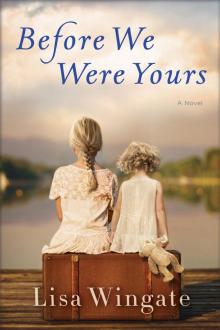 Before We Were Yours
Before We Were Yours A Sandy’s Seashell Shop Christmas
A Sandy’s Seashell Shop Christmas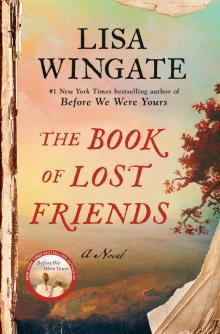 The Book of Lost Friends
The Book of Lost Friends Larkspur Cove
Larkspur Cove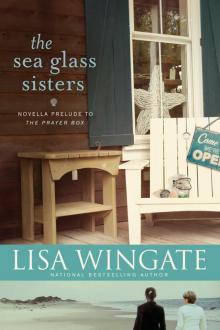 The Sea Glass Sisters
The Sea Glass Sisters The Language of Sycamores
The Language of Sycamores Dandelion Summer
Dandelion Summer Word Gets Around
Word Gets Around Beyond Summer
Beyond Summer Firefly Island
Firefly Island The Tidewater Sisters: Postlude to The Prayer Box
The Tidewater Sisters: Postlude to The Prayer Box Talk of the Town
Talk of the Town![Blue Sky Hill [01] A Month of Summer Read online](http://i1.bookreadfree.com/i1/03/29/blue_sky_hill_01_a_month_of_summer_preview.jpg) Blue Sky Hill [01] A Month of Summer
Blue Sky Hill [01] A Month of Summer A Thousand Voices
A Thousand Voices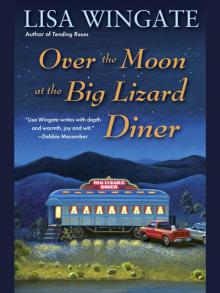 Over the Moon at the Big Lizard Diner
Over the Moon at the Big Lizard Diner Never Say Never
Never Say Never Good Hope Road
Good Hope Road The Summer Kitchen
The Summer Kitchen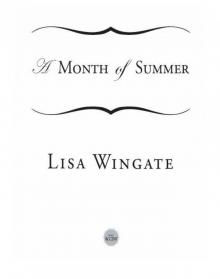 A Month of Summer
A Month of Summer Blue Moon Bay
Blue Moon Bay Drenched in Light
Drenched in Light The Sea Keeper's Daughters
The Sea Keeper's Daughters